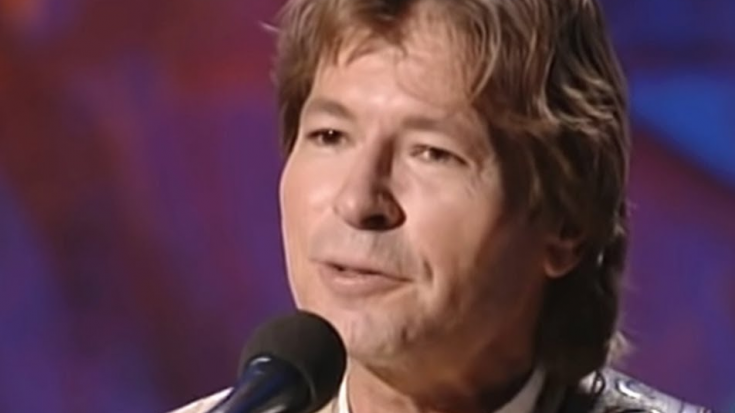How “Annie’s Song” Proves John Denver’s Amazing Songwriting Skills

via John Denver / YouTube
John Denver is often remembered first and foremost for his timeless hit “Take Me Home, Country Roads.” With its catchy melody and sing-along chorus, it became a cultural anthem that continues to resonate across generations. However, focusing solely on this song has somewhat eclipsed the depth of his broader body of work.
Denver’s catalog spans genres—folk, country, pop, and soft rock—and showcases his strengths as both a performer and a storyteller. Songs like “Rocky Mountain High” and “Sunshine On My Shoulders” hint at his unique ability to merge emotion with nature, creating deeply personal yet universally appealing music. But perhaps no track captures this talent more than “Annie’s Song.”
Released in 1974, “Annie’s Song” reached the top of the Billboard Hot 100, a feat that even “Country Roads” didn’t achieve. Written in a moment of raw vulnerability and introspection, the song stands as one of Denver’s most emotionally potent creations. It’s not just a love song—it’s a masterclass in how music can distill complex feelings into simple, beautiful expressions.
In this article, we explore how “Annie’s Song” reveals John Denver’s brilliance as a songwriter. From the real-life inspiration to the emotional complexity and lyrical beauty, every part of this song shows why Denver deserves recognition as more than just the man behind a country anthem.
A Moment of Inspiration on a Ski Lift
The origin of “Annie’s Song” is as poetic as the lyrics themselves. In the midst of personal turmoil—his separation from wife Annie Martell—Denver turned to the Colorado mountains for solace. Skiing in Aspen one day, he found himself overwhelmed not just by the majestic surroundings but by a surge of emotion tied to love, regret, and beauty.
According to his autobiography, Denver described how the sights, smells, and sounds of nature overwhelmed his senses on the ski lift. “Suddenly, I’m hypersensitive to how beautiful everything is,” he wrote. That sensory overload merged with his deep feelings for Annie, culminating in a flood of lyrical inspiration.
The entire song came to him in roughly ten minutes. That kind of creative burst is rare and speaks volumes about his artistic instincts. While many songwriters labor for days or weeks perfecting a track, Denver captured something raw and sincere almost instantaneously.
The backdrop of emotional pain combined with natural beauty created the perfect storm for artistic expression. It’s the sort of spontaneous inspiration that some might call divine, and Denver managed to translate that fleeting moment into a song that would last for decades.
Simplicity as a Strength
One of the most striking aspects of “Annie’s Song” is its lyrical simplicity. The lines—“You fill up my senses / like a night in the forest, like the mountains in springtime”—don’t rely on complex metaphors or elaborate rhyme schemes. Instead, they draw on universal imagery that anyone can understand and feel.
But simplicity doesn’t mean shallowness. On the contrary, Denver’s lyrics use common experiences to access deep emotion. By comparing his feelings for Annie to the grandeur of nature, he elevates personal love to something almost spiritual. These aren’t just compliments; they’re reverent tributes.
The structure of the song, with its gentle progression and soothing melody, mirrors the calming tone of the lyrics. Everything works together—the music, the words, the pacing—to evoke a sense of peaceful longing. It’s the kind of balance that only a seasoned songwriter can achieve.
Denver knew how to let a song breathe. There’s no clutter, no unnecessary embellishment. “Annie’s Song” is pure in its intent and execution, allowing listeners to project their own experiences onto it, which is part of why it remains so beloved.
View this post on Instagram
A Legacy of Emotional Honesty
Despite the beauty of the song, John Denver and Annie Martell didn’t have a fairy-tale ending. They divorced in 1982 after 15 years of marriage. But that doesn’t diminish the authenticity of the love that inspired the song—if anything, it enhances the poignancy of it.
“Annie’s Song” isn’t just a romantic gesture; it’s a time capsule. It captures a moment in which love, however complicated, felt overwhelming and real. That’s what great songwriting does—it preserves emotion in its purest form, even if the story behind it changes later.
The song also reveals Denver’s vulnerability, something not every male artist in the 1970s was willing to expose so openly. He wasn’t afraid to say, “This is how I feel, and it’s beautiful and painful all at once.” That kind of emotional transparency is a hallmark of true artistry.
In the end, “Annie’s Song” is more than a hit—it’s proof that John Denver had the rare ability to turn fleeting emotions into timeless music. For those who only know him for “Country Roads,” this track serves as an open invitation to explore the depth and beauty of his songwriting legacy.
View this post on Instagram












